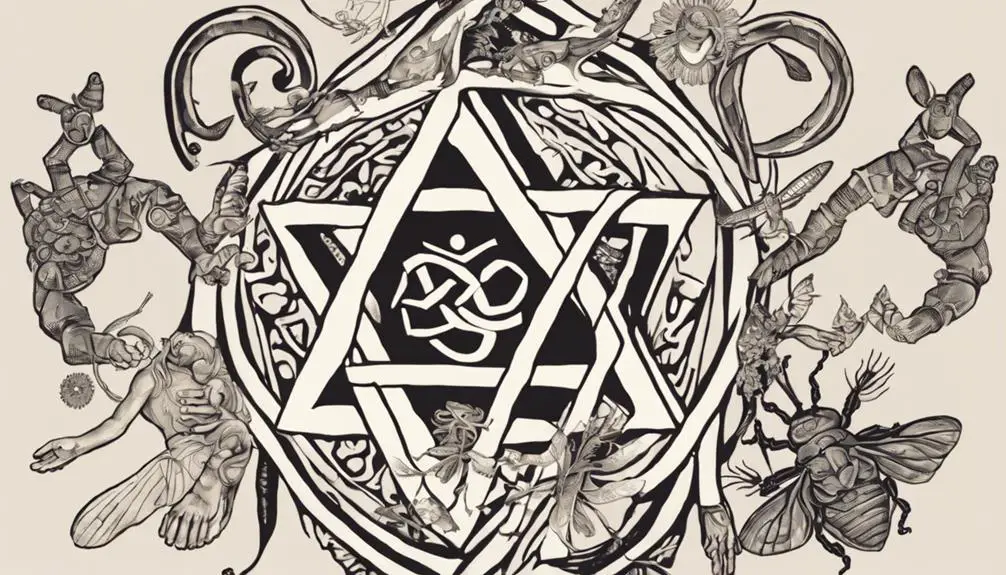Journey through ethical, religious, and ecological debates to uncover whether killing bugs is a sin, sparking curiosity and moral reflection.

Is It a Sin to Kill Bugs?
Did you know that there are over 900,000 known species of insects in the world? With such a staggering number, it's no surprise that you encounter bugs on a daily basis. Yet, when you swat a fly or step on an ant, have you ever paused to consider whether it's a sin?
This question isn't as straightforward as you might think. Exploring religious perspectives, ethical considerations, ecological impact, cultural views, and personal reflections offers a multifaceted approach to understanding the moral implications of killing bugs. Let's venture into this complex debate and uncover some thought-provoking viewpoints.
Key Takeaways
- Killing bugs raises ethical questions, reflecting conflicts between compassion and survival instincts.
- Religious and ethical perspectives often emphasize respect for all life forms, suggesting harm avoidance.
- Ecological impacts of killing bugs include biodiversity loss and environmental harm.
- Cultural views vary, with some traditions discouraging killing, promoting interconnectedness and compassion.
Religious Perspectives

Religious texts often address the sanctity of life, suggesting that the act of killing bugs can carry ethical and spiritual implications that believers are encouraged to consider carefully. Within these sacred writings, divine injunctions aren't always explicit about smaller forms of life, like insects, but the overarching messages about compassion, respect for life, and non-harm are clear. You're prompted to delve into scriptural interpretations to understand the nuanced positions regarding smaller creatures.
For instance, many scriptures advocate for a harmonious existence with all living beings, indirectly urging you to weigh the necessity and intention behind your actions. It's not merely about the act itself but the consciousness and consideration behind it. The ethical dilemma of killing bugs isn't resolved through a simple directive but requires you to engage with deeper spiritual principles.
You're encouraged to reflect on compassion and mindfulness in your interactions with all forms of life. This reflection is rooted in the belief that every creature has a role in the divine creation, and indiscriminate harm clashes with the pursuit of a virtuous, mindful life. Through this lens, religious perspectives offer a framework for considering the spiritual significance of even the smallest actions.
Ethical Considerations
Beyond spiritual teachings, you'll find that ethical considerations also play a crucial role in evaluating the act of killing bugs, urging a reflection on the broader implications of such actions on personal morality and societal norms. At the heart of these considerations lies the concept of moral ambiguity and the question of intentional harm. When you decide to kill a bug, are you acting out of necessity, fear, or convenience? This decision brings to light the complex nature of morality, where the lines between right and wrong aren't always clear.
- The pain and suffering of living beings, regardless of their size, evoke deep ethical questions about compassion and empathy.
- Intentional harm to any creature raises concerns about the values we uphold and the kind of world we wish to create.
- The act of killing, even a bug, can desensitize individuals to violence, fostering a culture where life is undervalued.
- Moral ambiguity challenges us to constantly evaluate our actions and their impact on our character and ethics.
- Reflecting on the reasons behind our actions can lead to a broader understanding of respect for all forms of life.
In navigating these ethical waters, you're encouraged to ponder deeply on the consequences of your actions, not just for the bugs, but for the moral fabric of society.
Ecological Impact

Examining the ecological impact of killing bugs reveals a complex web of consequences for our planet's ecosystems and biodiversity. When you consider the role of insects in pollination, soil aeration, and as a food source for other species, it's clear that their eradication can lead to significant biodiversity loss. The widespread use of pesticides, often employed to kill pests, further exacerbates this issue, contaminating soil and waterways, and affecting non-target species.
Impact |
Description |
|---|---|
Biodiversity Loss |
Reduces the variety of life, leading to fragile ecosystems. |
Pesticide Use |
Harms non-target species and leads to environmental pollution. |
Soil Health |
Degradation of soil quality due to loss of insect aerators. |
Food Web Disruption |
Imbalances in natural predator-prey relationships. |
It's essential to weigh these ecological ramifications carefully. From a scriptural perspective, stewardship of the Earth implies a responsibility to maintain its biodiversity and health. Ethically, indiscriminate killing of bugs can be seen as a disregard for the intricate balance of our ecosystems. The challenge lies in finding a balance that respects both our needs and those of the planet.
Cultural Views
As we consider the ecological intricacies of insect management, it's essential to explore how various cultures perceive the act of killing bugs within the frameworks of their ethical and scriptural traditions. Historical attitudes and artistic interpretations have significantly influenced these views, providing rich, varied perspectives on the morality of killing insects.
- In many Eastern traditions, the act of killing any living being, including insects, is often discouraged, emphasizing compassion and non-violence as core ethical principles.
- Native American cultures traditionally view all forms of life, including bugs, as sacred and interconnected, advocating for respectful coexistence.
- In contrast, some Western philosophies prioritize human convenience and agricultural productivity, sometimes justifying the killing of insects for these ends.
- Artistic interpretations, from ancient cave paintings to modern digital media, frequently depict insects as symbols of transformation or decay, influencing societal attitudes towards their value or expendability.
- Historical texts, scriptures, and legal codes from various cultures provide guidelines that range from strict prohibitions against harming any life form to allowances under specific conditions, reflecting the complex ethical considerations involved.
These cultural lenses offer a diverse array of views on the subject, inviting you to ponder the ethical dimensions of your interactions with the insect world.
Personal Reflections

You might find that your personal stance on killing bugs intersects deeply with your ethical and spiritual beliefs. When faced with the decision to kill a bug, you're not just acting on a whim; you're engaging with a complex web of values that includes human empathy and survival instincts. Scripturally, many traditions emphasize the sanctity of all life, urging followers to consider the impact of their actions on the smallest of creatures. This isn't just about bugs; it's about how you view your place in the world and your responsibility towards other beings.
Analytically, the act of killing a bug can be seen as a moment where survival instincts override empathy. Yet, this doesn't mean empathy is absent. You might feel a pang of guilt or question if there was another way to handle the situation, reflecting a deep-seated ethical dilemma. The balance between preserving your environment and respecting life is a tightrope walk, and where you stand on this issue says much about your values.
Frequently Asked Questions
What Are the Most Humane Methods for Controlling Bug Populations in Residential Areas?
To control bug populations humanely, you should adopt Integrated Pest Management strategies and use natural repellents. This ethical approach balances effectiveness with respect for life, blending analytical thinking with a scriptural and ethical perspective on coexistence.
Can Certain Bugs Be Beneficial to My Home Environment, and How Can I Attract Them?
Yes, certain bugs can benefit your home environment. Integrating garden designs that attract these insects and utilizing compost benefits your garden's health. Analyze which species are advantageous and ethically encourage their presence for a balanced ecosystem.
Are There Any Health Risks Associated With Not Eliminating Certain Types of Bugs From Living Spaces?
Yes, not eliminating certain bugs can pose health risks. You're risking bug allergies and pest-related diseases by cohabiting. It's crucial to balance ethical considerations with safeguarding your health by managing these pests appropriately.
How Can I Teach Children About the Importance of Bugs in the Ecosystem Without Encouraging Them to Harm Them?
To teach kids about bugs' ecosystem role, blend moral perspectives and cultural beliefs. Show them bugs' benefits and promote kindness. This ethical approach helps them respect life, aligning with scriptural teachings on compassion and stewardship.
What Are the Legal Implications of Using Chemical Pesticides in Residential Areas to Kill Bugs?
You'll find pesticide regulations vary widely based on residential zoning laws. It's crucial to consider the ethical implications and ensure you're not violating local guidelines, which could legally backfire and harm the environment further.
Conclusion
In conclusion, whether killing bugs is seen as a sin varies widely across religious, ethical, ecological, and cultural perspectives. Scripture and ethical teachings often urge compassion towards all living beings, highlighting the importance of understanding our ecological impact and respecting life.
Culturally, views differ greatly, reflecting diverse values and beliefs. It's essential to reflect personally on these aspects, weighing the harm against necessity, to navigate this moral landscape with mindfulness and responsibility.



Sign up